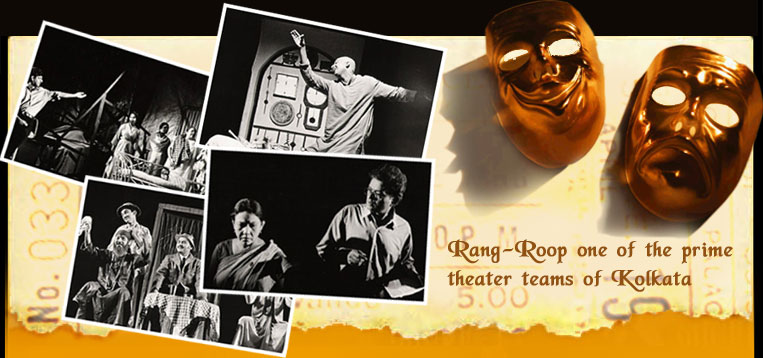

| Productions | ||||||||||||||||||||||||||||||||||||||||||||||||||||||||||||||||||||||||||||||||||||||||||||||||||||||||||||||||||||||||
|
Recent Productions: SYNOPSIS of Mukhosh Nritya. Exposing the hypocrasy, insecurity and selfish, motive-driven psychology of the so-called educated, liberated upper class, Mukhosh Nritya makes an ironical comment on their lofty claims to reform and uplift society. The play unfolds the variegated life stories of three college friends, who meet after many years. Now Middle-aged and well settled in their respective lives, they belong to the upper echelons of the society. Riya is a housewife who spends her days in idle, self-centred activities, concerned only with her own beauty, leisure and entertainment. Manisha is a feminist and social activist, bearing the mighty burden of women's emancipation on her shoulders. Tapashi is the typical housewife whose life revolves completely around her husband and children. She has lost her own identity and is now a shadow of her former self, echoing the opinions of her successful husband. Having attained the peak of personal success and happiness, the friends' conversation Fqcusses on apparently responsible social issues. Yet it gradually becomes clear that they are concealing their true selves from one another. Sophisticated and modern only in outward appearance, they are actually superstitious, insular and narrow-minded, unlike Jhunu, a young maid-servant, who is trying to overcome social shackles. SYNOPSIS of Jolchobi. Mrinmoyee, now over forty, was once called 'Nafisa AH of Naranpur’. When she was inher youth, the boys of her generation used to feel proud on just having a few words with her. How/ever, the present defies the proverb 4Morning shows the day'. After the demise of her father, the responsibility of her family with her mother and t younger sisters was bestowed upon her shou Her self respect, self idei her dream with her life, h planning;all started deviating from what it should be. Her struggles, just for the pass the days off, chang unknown woman. Keeping on confronting will adversities in all walks of in home, in office; - she I. her mental stability, and was sent to mental asylum at Mankundu. In the mean time, her sisters got married. So the responsibility of her aged mother, who is now seventy, came solely upon her shoulder on her returning from the asylum. She started walking on a new path of life, alone, because her mother was neither been her mother, nor a friend as well, but just a woman, defeated in every aspect of life, who even could not stand a separate imago of her daughter apart from the regulation of the family. So, now, a deformity of the relationship started. The1 deformity got shape of a violent form when an old friend of Mrinmoyee, popularly called as 'Poto’, proposed to marry her. Mrinmoyee started dreaming a new life afresh. A letter of Poto, which might have changed the direction of monotonous, exhausted life of Mrinmoyee, incidentally fc came to the hands of her mother instead, and soon she burnt it. Mrinmoyee could no longer hold her humanity, when the last hope of her survival went far away from her. In utter hatred, she killed her mother. But, did her mother eventually die. Mrinmoyee started to feel the presence of her mother in her every step, every behavionfl breathing Before she had completely metamorphosised. Synopsis of Byaram Biram. From the earliest days of creation, mother - nature has nurtured humans, ensured their growth, recovery and survival and finally allowed them to age and degenerate. Ancient medical science therefore kept faith on nature. Modern medical science however, has largely tampered with nature. Consequently, mankind continues to suffer from more virulent attacks of old as well as new diseases. As man rejoice his triumph over nature, she decides to settle scores in this unequal battle and who wins is anybody's guess. Whether progress of medical science can actually improve the quality of human health is rathar debatable issue.In his quest to resolve all related confusion a commoner like Golokpati (himself a chronic dyspeptic and the lone member of his family) visits the renowned gastroenterologist, Dr. Palodhi. To his surprise, he discovers another chronic patient in his doctor. At this juncture, a third person appears on stage. Who is that ! - leaves a question on his identity, for every one. Some obvious truths of life and secrets of healthy existence are unfolded through pun, humor and pure comedy. We are all familiar with such truths in the way that - "they are all known faces but do we really know them?" He Mor Debota. The core of the drama contains the everlasting, infallible fragrance of love. In the perspective of all-devouring panic of Turkish invasion, the drama projects the intricacies of mankind, their relative situations and insecurities, racial conflict which leads to insurgent attitude. The character ‘Pagol’ (The mad), who adheres in every aspect and founds to be homomorphous to the God, proves the disability of himself or the God in disguise and says that he creates, just to rejoice his creation. He (The God instead) is not a prophet. He enjoys and cherishes every bit of uncertainty in the living world. This, at the same time threatens and warns our impetuous religious prejudice and sharpens our conscience, subsequently. On the other hand, the playwright establishes through ‘Bhavananda’ (Another Character of the play) that it is a sin to loose faith upon human, humane and humanity. In absolute adversity, he (Bhavananda) cannot make himself displeased towards his hostile compatriot. He is the man, who believes firmly, that it is love, which in long term, will win over all the antagonistic forces. All Productions:
This will come reverse, means latest will come first |
||||||||||||||||||||||||||||||||||||||||||||||||||||||||||||||||||||||||||||||||||||||||||||||||||||||||||||||||||||||||